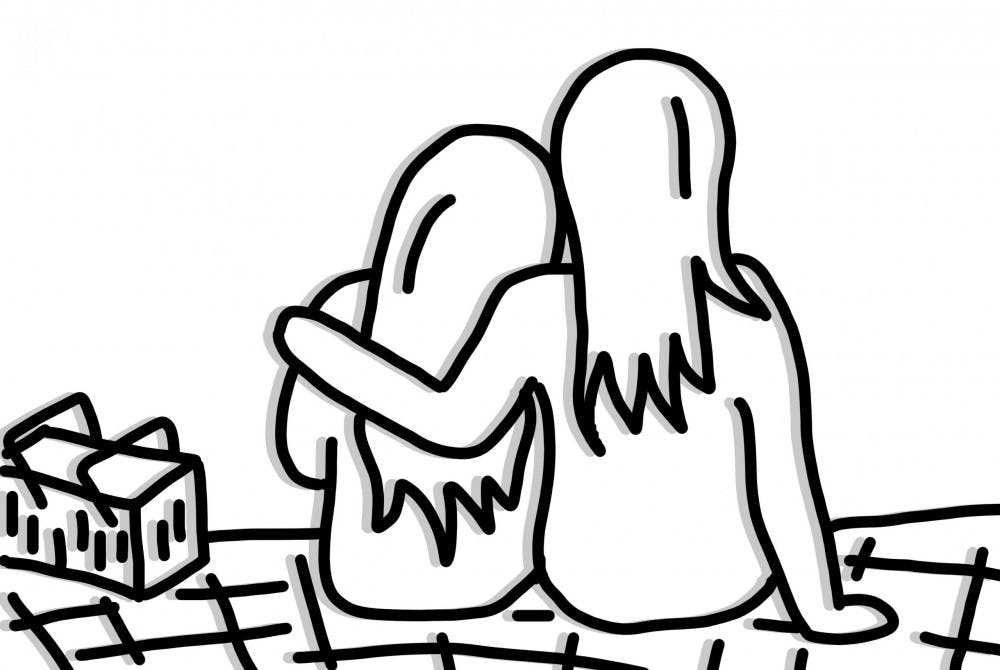Community members gather to show solidarity against acts of hate.

By Drew Jelinek
Over a hundred community members came together on Oct. 25 to attend the Show Up For Love solidarity rally — where speakers described their experiences with racism, and attendees participated in small group discussion with each other. The rally was held at the Arch of Healing and Reconciliation directly located across the street from Bellingham City Hall.
Eve Smason, a board member of the Whatcom Human Rights Task Force, cited recent white supremacist activity, such as putting flyers on Bellingham businesses with swastikas, as the primary reason her organization came together with six other groups to create the rally. The goal was to create community solidarity and give opportunity for in-depth discussion. The other organizers included the Whatcom Focused Youth Movement, Bellingham Unity Committee, The Whatcom Peace and Justice Center, Mission Accomplished?, WWU SUPER and the Riveters Collective.
In a statement from the Bellingham Police Department, Police Chief David Doll asked for the community's cooperation during the investigation of the swastika flyers.
“We are investigating multiple reports of flyers with swastika symbols posted downtown and in Fairhaven, which we began hearing about Saturday morning,” Doll said. “We encourage people to report them, or any information they have about them, by calling 911. We ask that people not try to remove them, but rather let us remove them, as they may have value as evidence in our investigation. These terrible displays of hate will not be tolerated in our community.”
In a statement also distributed by the BPD, Bellingham Mayor Seth Fleetwood further emphasized that the city opposes the use of the symbol and its associations.
“It is disturbing to know we have even a few people this filled with rage and whose fear and resentments blind them from a common sense of dignity and decency,” Fleetwood wrote. “This is a small number of people who are fearful of the better future that the rest of us envision.”
Similar postings of stickers or flyers have been reported several times in Bellingham, such as stickers found on Western’s campus last October, or stickers found around town by a redditor February of this year. The Western Front reached out to the Bellingham Police Department for the official number of reports but was met with no response.
Another member of the Whatcom Human Rights Task Force, David Crook, said it's important to respond directly to these incidents.
“We are already an 85% white town, we’re already a place where people [of color] don’t feel they have safety, so it’s really important to respond to that stuff when it happens,” Crook said.
The rally began with a land acknowledgment and continued with a lineup of speakers including Robert Lashley, a local poet; Tyler Burbin, a member of the Jewish voices of Peace; Terrance Morris, a community social justice speaker; and Terrence Adams, a member of the Lummi Nation. Both Morris and Adams also spoke at the peaceful solidarity rally in June. Each speaker gave their perspective on experiencing racism. Several expressed a lack of surprise when they heard about the flyers.
Towhee Wean, a board member of the Riveters Collective, recalled how her group created a similar event last year responding to alleged Proud Boys distributing flyers around Ferndale.
Afterward, event volunteers facilitated small-group discussion in socially distant circles. Facilitators then asked their groups to set and share goals to counteract systematic racism, and set those goals to a tomorrow, one month and one year timeline.
Smason said the discussions were meant to inspire, create change and help people feel safer in the community.
“When you have someone who is masked and flyering in the middle of the night, how do you stop them?” Samson said. “And I think there are a lot of creative solutions that deserve being talked about and formed as a community.”
Ceci Lopez, assistant professor and director of the Law, Diversity and Justice Center at Fairhaven College, noted that discussions have changed since last June’s vigil and march for George Floyd. Lopez said she believes both Bellingham and the nation have had a continuous awakening since Floyd’s death, and conversations have expanded.
Lopez also noticed that conversations have started with acknowledging systems of oppression.
“I think that has been a huge movement forward where the conversation can now begin with ‘How do we shift these issues?’ rather than, ‘Are these things real?’” Lopez said.
Lopez said the process will take time and patience.
“The process is going to be an even flow, where we are going to move forward a bit,” Lopez said. “We might have to slow down for a little bit, and just be flexible that way because these systems of oppression are incredibly violent.”
Lopez added that for millions of years human survival has depended on understanding and negotiating with each other.
“When we are pursuing a common goal, we have a tremendous ability to work with each other,” Lopez said.





